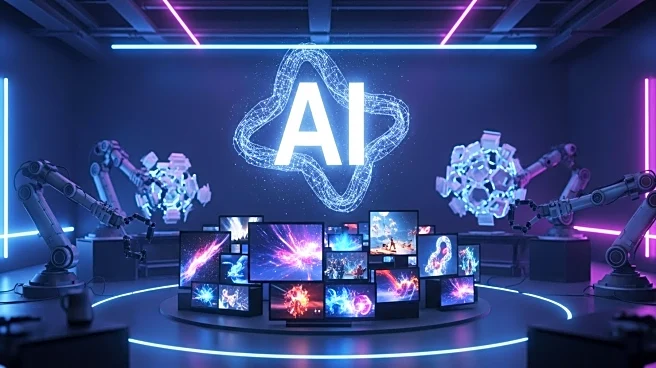What's Happening?
OpenAI is backing the creation of an animated film titled Critterz, which is largely produced using AI technology. The film, developed by Vertigo Films, aims to demonstrate that generative AI can produce movies faster and more cost-effectively than traditional Hollywood methods. Critterz, with a budget under $30 million, contrasts sharply with typical animated film budgets, such as Toy Story 4's $200 million. The project involves AI-generated images from OpenAI's Dall.E tool, which are then animated by a team of Emmy award-winning artists. Human actors will provide voices, and the script is crafted by writers from the film Paddington in Peru. OpenAI's involvement is limited to providing tools and computing resources, with no direct role in production or marketing.
Why It's Important?
The initiative represents a significant shift in film production, potentially reducing costs and democratizing content creation. If successful, Critterz could accelerate Hollywood's adoption of AI technologies, impacting the industry by lowering production expenses and enabling broader creative participation. However, this shift may also threaten traditional roles in animation and film production, as AI tools could replace human labor, raising concerns about job security for artists and animators. The film's success could validate AI's capability to produce high-quality content suitable for major releases, influencing future industry standards.
What's Next?
The film's release will test AI's viability in mainstream cinema, with potential implications for future productions. Success could lead to increased investment in AI-driven projects and a reevaluation of production processes across the industry. Stakeholders, including filmmakers, studios, and technology companies, will likely monitor Critterz's performance closely to assess AI's role in creative industries. The outcome may prompt discussions on ethical considerations and copyright issues related to AI-generated content.
Beyond the Headlines
The use of AI in film production raises questions about intellectual property rights, as AI-generated content currently lacks copyright protection. By involving human creators, Critterz aims to secure copyright eligibility, highlighting the legal complexities of AI in creative fields. Additionally, the project underscores the cultural shift towards embracing technology in storytelling, potentially redefining artistic expression and collaboration.












